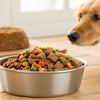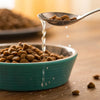Should Senior Dogs Eat Wet Food? Understanding Your Aging Companion's Nutritional Needs
- Houndsy
Table of Contents
- Introduction
- The Dietary Needs of Senior Dogs
- Why Wet Food Can Be a Good Choice
- How to Transition Your Senior Dog to Wet Food
- What's the Alternative? Dry Food Benefits
- Signs That Your Senior Dog Might Benefit From Wet Food
- Listening to Your Veterinarian
- Final Thoughts
- FAQ Section
Introduction
Imagine your beloved dog, once full of energy and enthusiasm, now appearing disinterested in meals. This scenario is all too common for pet owners with senior dogs. As our furry companions age, their nutritional needs evolve just like their physical capabilities. In fact, studies indicate that approximately 50% of dogs aged seven and older deal with some form of health issue, which can significantly impact their dietary requirements.
As conscientious pet parents, the question we often ponder is: Should senior dogs eat wet food? The answer can greatly differ based on each dog's specific needs, preferences, and health considerations.
In this blog post, we will explore the advantages and disadvantages of wet food for senior dogs, dive deep into the different types of dog food available, and provide you with insights into when and how to transition your aging dog’s diet. By the end, you will have a clearer understanding of what dietary choices can contribute to your dog’s overall well-being, enabling you to make informed feeding decisions.
Let’s embark on this journey together, considering our own feeding routines for our cherished pets, as we uncover the nuances of senior dog nutrition.
The Dietary Needs of Senior Dogs
As dogs age, their bodies undergo multiple changes which necessitate adjustments in diet to maintain optimal health. Here are some critical factors that contribute to the changing dietary needs of senior dogs:
1. Slowed Metabolism and Weight Management
Older dogs typically experience a slower metabolic rate. This can lead to weight gain if their food intake remains the same as when they were younger. Managing their diet and ensuring they receive suitable portions becomes crucial, as obesity can exacerbate numerous health issues, including arthritis and heart disease.
2. Dental Health
Many senior dogs face dental challenges, ranging from tooth decay to gum disease. Chewing dry kibble can often become uncomfortable for them. In contrast, wet food is easier to chew and swallow, which can help alleviate discomfort and promote a more enjoyable eating experience.
3. Changes in Appetite
Age-related health issues can lead to decreased appetite in senior dogs, prompting them to turn their noses up at their usual food. Wet food often has a more enticing aroma and flavor, which can stimulate their interest in eating.
4. Digestive Health
As dogs age, digestive efficiency can decline. Softer, wet food can be easier for older dogs to digest, providing necessary nutrients without causing gastrointestinal distress. Additionally, wet food often contains higher moisture content, contributing to better hydration and digestive health.
5. Hydration
Hydration is especially critical for senior dogs, who may not drink as much water as they should. Wet food's high moisture content ensures that our dogs receive essential hydration alongside nutrients, which is particularly beneficial for those prone to urinary issues or kidney diseases.
Why Wet Food Can Be a Good Choice
Having established the unique needs of senior dogs, let’s delve deeper into why incorporating wet food into their diets can be beneficial:
Attributes of Wet Food
-
Higher Moisture Content: Wet dog food typically contains around 75-78% moisture, significantly higher than dry food, which usually has about 10% moisture. This moisture facilitates hydration.
-
Easier to Chew: Wet food is generally softer and requires less chewing, aiding dogs with dental issues or missing teeth.
-
Enhanced Palatability: The rich aroma and taste of wet food can entice even the pickiest eaters. For senior dogs who have become less enthusiastic about meals, this can make a world of difference.
-
Variety and Texture: Mixing wet food with dry kibble can add variety and texture, making mealtime more stimulating and enjoyable for our furry friends.
Considerations for Choosing Wet Food
While wet food can be a splendid option for many senior dogs, it is essential to be discerning about the brands and types we choose. Here are some considerations:
-
Quality Ingredients: Look for high-quality, wholesome ingredients free of fillers or artificial preservatives. Opt for brands that use real meat as the primary ingredient.
-
Nutritional Balance: Ensure the wet food is nutritionally complete and tailored for senior dogs. This includes appropriate levels of protein, fat, fiber, and essential vitamins and minerals to support overall health.
-
Hydration Needs: For dogs already well hydrated, introducing some wet food gradually can help prevent stomach upsets. Therefore, consulting with a veterinarian is vital before making significant changes.
How to Transition Your Senior Dog to Wet Food
Changing your dog’s diet is a process that must be approached gradually to avoid digestive disruptions. Here are steps to ensure a smooth transition:
1. Start Slowly
Begin by mixing a small amount of wet food with your dog’s regular dry food—around 25% wet food to 75% dry. Over the course of 5-7 days, gradually increase the percentage of wet food while reducing the dry food accordingly.
2. Monitor Reactions
Keep an eye on your dog’s behavior during the transition. Look for any signs of allergies, gastrointestinal upset, or preference changes. If any adverse reactions occur, reverse the ratio back to a previously tolerated mix.
3. Adjust Portions
Feeding portions can vary significantly depending on the brand and nutritional density. It's essential to adjust portion sizes to maintain your dog’s ideal weight. Your veterinarian can provide guidance based on your dog’s individual caloric requirements.
4. Evaluate and Consult
Regularly assess how your dog responds to the new food. If appetite remains low, consider introducing different flavors or brands of wet food. Also, conferring with your veterinarian when making any changes can provide personalized recommendations.
What's the Alternative? Dry Food Benefits
While wet food can be beneficial, it’s worth mentioning that dry kibble still has its own set of advantages:
-
Dental Benefits: Chewing dry kibble can help reduce tartar build-up, contributing to overall dental health.
-
Cost-Effectiveness: Dry food is usually less expensive than wet food in terms of packaging and storage.
-
Convenience: Kibble is easier for on-the-go feeding and doesn’t spoil as quickly as wet food.
Balancing both dry and wet food in your senior dog’s diet can provide an optimal mix of hydration, nutrition, and enjoyment.
Signs That Your Senior Dog Might Benefit From Wet Food
To determine if our dogs might need a diet change, we should be observant of specific signs, including:
- Difficulty chewing hard kibble or avoiding food altogether.
- Noticeable changes in appetite or enthusiasm for meals.
- Signs of dehydration such as lethargy or dry gums.
- Weight gain or loss without any apparent reason.
If any of these signs resonate with you, it would be wise to explore the possibility of incorporating wet food into your senior dog’s diet.
Listening to Your Veterinarian
We cannot stress enough that consultation with a veterinarian should be the first step in significant dietary changes. They can offer guidance tailored to your dog's health needs, recommend specific brands or formulations, and discuss strategies that may support your aging companion's quality of life.
Your vet can also advise on how to manage underlying health issues that could affect dietary choices and suggest appropriate supplements that could enhance your dog’s well-being.
Final Thoughts
The golden years for our dogs should be filled with comfort, love, and health, and diet plays a significant role in this. By understanding the nutritional requirements of senior dogs, we empower ourselves to provide them with what they need to live their best lives.
Ultimately, the question of whether senior dogs should eat wet food hinges upon their individual needs. For many, wet food can yield increased enjoyment at mealtime, better hydration, and improved health outcomes. Whether moistening dry kibble for easier consumption or opting for standalone wet food, we should aim for balanced nutrition that considers both the physical and emotional aspects of our dogs’ well-being.
If you’re contemplating improving your dog's feeding experience, consider the Houndsy Kibble Dispenser for a functional yet stylish addition to your dog feeding routine. It delivers perfect portions every time and enhances the feeding experience by eliminating the mess associated with traditional feeding methods. Explore the Houndsy Kibble Dispenser here.
FAQ Section
Can my senior dog eat both wet and dry food?
Yes! Many pet owners find that a combination of wet and dry food can provide the best of both worlds. This mixture can ensure adequate hydration while still promoting dental health.
What should I do if my senior dog refuses to eat?
If your senior dog is refusing to eat, try warming their food, mixing in a little wet food, or adding mealtime toppers to make it more appealing.
How do I know if my dog is transitioning well to wet food?
Monitor your dog’s appetite, energy levels, and overall demeanor. Any ongoing digestive issues or preference shifts should be observed closely, and persistent challenges should prompt a veterinary consultation.
How often should I feed my senior dog?
Typically, feeding two to three meals a day is ideal for senior dogs. However, it’s essential to adhere to the recommended portion sizes and make adjustments based on individual needs.
Are there any specific brands recommended for senior wet food?
It is advisable to choose high-quality brands that offer well-balanced nutrition for senior dogs—brands like Royal Canin and Hill's Science Diet are often recommended by veterinarians but always tailor your choice based on your dog's specific needs and taste preferences.
Ultimately, ensuring a nutritious, appealing, and enjoyable feeding experience will enhance not only our dogs' health but our relationship with them as well. Let's continue to give them the love and attention they deserve during their golden years!












